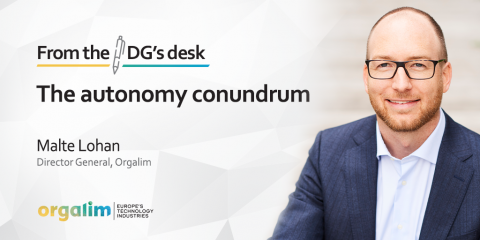From the DG's Desk: The autonomy conundrum
22 January 2021

The handover of power in the US this week has held many of us in thrall for several reasons. Not least of them, President Biden's inauguration promises a marked improvement in transatlantic relations and a welcome opportunity to once again cooperate on numerous issues of enormous importance to Europe's technology industries – from the global trade system to standards, artificial intelligence to data flows.
But this will not be a case of going back to 'as you were'. The Trump era – and the pandemic – have irrevocably changed things. Crucially, they have focused minds on what the EU calls 'strategic autonomy'. Fuzzy though it is, the concept seems here to stay. How will it play out? Wherever you stand on the autonomy debate, the trade and technology arena is shaping up to be potentially the biggest testing ground of Europe's strategic autonomy ambitions. Arguably, it is also where we hold the strongest cards, if we play them right.
To navigate this shifting geopolitical landscape, and avoid the pitfalls, our industries have long called for greater clarity on what the EU means by 'strategic autonomy'. It is easier said than done. EU foreign policy chief Josep Borrell once tried to explain it by invoking Frank Sinatra: doing it 'my way'. After months, even years, of discussion, December gave us a rather more tangible example: the EU-China Comprehensive Agreement on Investment. It encapsulates the EU’s ambition to be more assertive, prepared to act on its own terms.
If this is strategic autonomy at work, then it is easier said than done.
And yet the China deal – though long awaited and much needed – was hardly a universal cause for celebration. Many worried it did not go far enough in reining in unethical or unfair practices in China. Others warned that even this relatively limited agreement would not help the EU get off on the right foot with the new US administration. It may even have strengthened China's hand in its struggle with the US for global supremacy. If this is European strategic autonomy at work, then it is definitely easier said than done.
What seems clear to me is that, if Europe is serious about being more assertive on the global stage, two things are needed. First, a more honest discussion about the inevitable trade-offs required. Acting on our own terms comes with a price. It’s important that Europe – and its citizens – are under no illusions on this.
Second, Europe needs to put more energy into strengthening its own hand. And this is precisely where our technology leadership comes in. Whether it is the advanced manufacturing technologies that are transforming all parts of industry, the components for smart renewable energy systems, or the high-tech gear for connected low-carbon mobility, European companies are at the forefront of the green transition that the world so urgently needs. Playing to our strong suits in these and other industrial technologies, generating the next wave of global industrial leaders, has to be key to helping Europe build its authority on the global stage.
Europe needs to put more energy into strengthening its own hand. This is where our technology leadership comes in.
To do so, Europe’s continued commitment to free, fair and open trade will be critical: unlocking new market opportunities for our export-oriented industries while protecting them from unfair competition. And here, the importance of a more balanced and constructive relationship with the US cannot be overstated. Renewed transatlantic ties are needed, not least, to solve "bilateral trade irritants" including US tariffs on steel and aluminium. More importantly, it is only by joining forces that the EU and America will succeed in saving the World Trade Organization – and with it the future of an open, rules-based global trading order.
Europe’s path to greater autonomy will remain rocky. Finding common ground with the US on digital taxes, data privacy, or regulation of online platforms, tough though that is, may yet seem like child’s play in comparison with some of the geopolitical implications we may face in going our own way. But Europe has rightly made up its mind to open a new chapter, with industry and technology in the front line. Call it autonomy or something else, I am convinced we are well placed to turn this chapter to Europe’s advantage.

Malte Lohan,
Director General